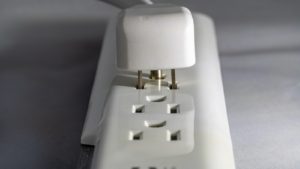Dos And Don’ts Of Extension Cord Safety At Workplace

Extension cords are a common sight at a variety of different workplaces ranging from offices to construction sites. Unfortunately, spotting an incorrectly used extension cord is also a regular occurrence.
Whether they lack the knowledge to use the cords correctly or it’s more convenient to take shortcuts, people often make dangerous mistakes when they use an extension cord. Today, we’re going to talk about the dos and don’ts of extension cord safety in the workplace to prevent injuries and accidents.
Do Choose the Right Extension Cord for Your Purposes

Having the right tools for a job is critical, and that’s true for extension cords, too. Some cables are for indoor use, while others are suited for the outdoors. One cord might be insulated for 300 volts, while another might protect against 600 volts.
Manufacturers might make a cord jacket that protects the wires within an extension cord from various materials. At times, it’s essential to know what those materials are.
Some cords have additional functionality that others lack. Sensitive electronics in need of surge protection and people interested in saving power may benefit from using extension cords with switch.
When you flip the switch, everything connected to the cord will gain or lose power, allowing you to start or stop operations quickly. In the event of a power surge, the switch may automatically flip, protecting sensitive equipment.
Don’t Forget To Check the Wattage Rating.
Unless you frequently find yourself powering equipment with high energy needs, you might not have considered the wattage rating assigned to each extension cord. It will rarely affect you at home, but the electronics you use in a professional setting are usually in a different class.
The longer an extension cord is, the lower its capacity for carrying a current. That means that longer extension cords have lower wattage ratings. Depending on what you’re attempting to power, you may need to know that number.
The copier in your office, for example, probably uses between 1,400 and 1,600 watts at peak power. If the extension cord you’re using is 16-gauge and more than 50 feet in length, you’ll run into trouble because it’s only capable of powering equipment up to 1,250 watts.
Do Look for Damage Before Using the Cord

Before you use a cord, inspect it for damage. Cracks in the cord’s coating, visible wires, and bent prongs indicate that something is wrong.
While you should always check a cord before using it, this is especially true if it’s been in storage for a while or you’re moving it directly from one area of use to another.
Don’t Plug Extension Cords Into One Another.
Someone has probably warned you before not to plug extension cords into one another, but do you know why? The short answer is that it’s dangerous and inefficient.
The lengthier answer is that when you connect two extension cords, their overall resistance increases. That means they’re more likely to get hot to the touch. Heat may damage the cord’s coating.
Damaged cords lead to an increased risk of fires and electrical shocks.
Longer cords are also more significant trip hazards, which is another problem entirely. Someone might trip over a single cord as well. However, if you had connected two cords, they may pull apart wholly or partially, causing issues with the equipment you’re powering.
Do Keep Extension Cords Away From Water
Electricity and water don’t mix, so you should keep extension cords as far away from moisture as possible. Even if both ends of the extension cord are clear of water, don’t run the cord through a puddle. You may not see damage to the cord, but that doesn’t mean it isn’t there. The entire pool could become a shock hazard.
If you need to use an extension cord in a damp environment, make sure the outlet you’re plugging the cord into has a ground-fault circuit interrupter or GFCI. GFCIs prevent ground faults before they happen.
In addition, always make sure you’re using an extension cord meant for outdoor use when you’re outside, as it will be more capable of withstanding the elements.
Don’t Let Extension Cords Become Permanent.

While convenient and helpful, extension cords should not become permanent fixtures in your workplace for a couple of reasons. First, they’re trip hazards when not positioned and appropriately secured. Second, the longer they’re used, the more wear and tear they’re subjected to. Because they’re not meant to be permanent, that makes an extension cord a likely point of failure.
If you find that you’re using an extension cord in the same place for an extended period, either rearrange what it’s powering or have proper wiring installed. It will save you time and money in the long run while also making your workplace safer.
Maintaining a safe workplace is essential for the well-being of your employees and clients alike. Using extension cords properly is just one way you can help keep yourself and everyone around you safe.


